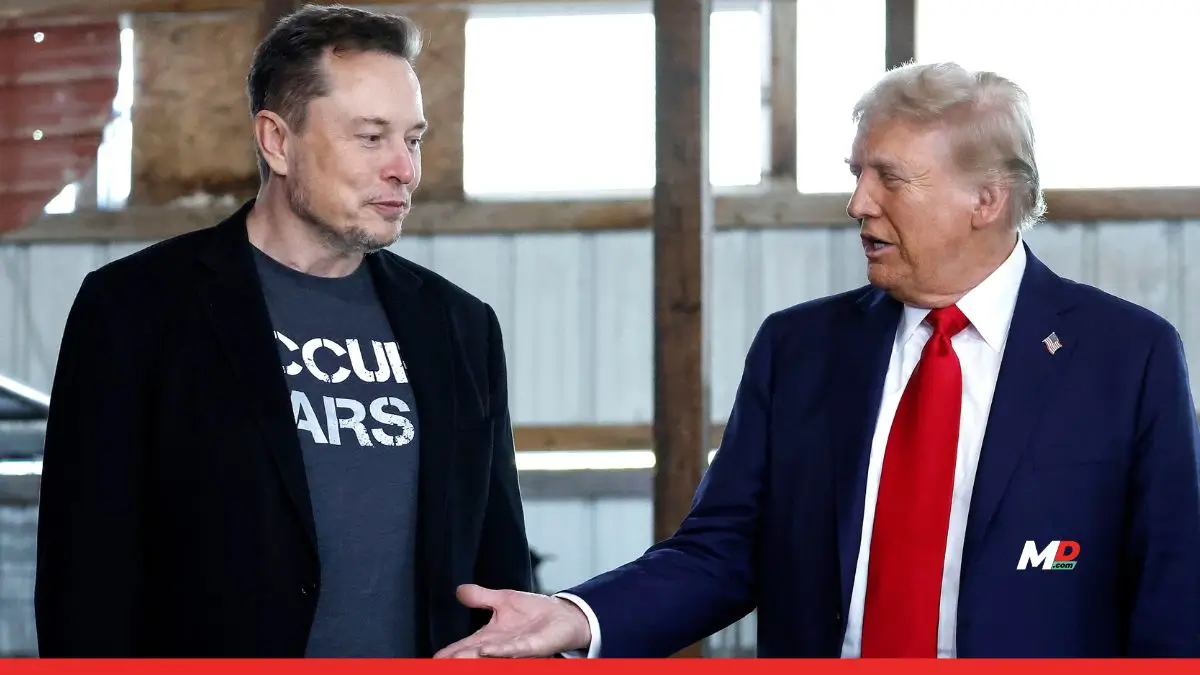Business
“Very Unfair”: Donald Trump on Elon Musk’s Tesla Building a Factory in India
Published
12 months agoon
By
Ann Uruvath
The Indian government recently introduced a new electric vehicle (EV) policy aimed at attracting global manufacturers, including Tesla. Under the policy, carmakers investing at least $500 million and setting up a factory in India will see a reduction in import duties from around 100% to just 15%. Following this announcement, Tesla has ramped up hiring efforts in India, signaling its potential market entry as early as April this year. However, former U.S. President Donald Trump has voiced strong disapproval, calling Tesla’s plans to build a factory in India “very unfair” to the United States.
Trump’s remarks came during a joint interview with Tesla CEO Elon Musk for Fox News’ Sean Hannity. Expressing concerns over trade imbalances, Trump stated, “Every country in the world takes advantage of us, and they do it with tariffs… It is impossible to sell a car, practically, in, as an example, India.”
Trump Criticizes India’s Tariff Policies
During the interview, Trump reiterated his long-standing complaint about India’s high tariffs on imported goods, particularly automobiles. He recalled raising the issue during Indian Prime Minister Narendra Modi’s recent visit to the United States. Despite the two leaders agreeing to work towards a trade deal, Trump remains unconvinced about India’s trade policies.
“Now, if [Musk] built the factory in India, that’s okay, but that’s unfair to us. It’s very unfair,” Trump asserted. The former president has consistently advocated for “reciprocal tariffs,” where the U.S. would impose the same level of tariffs on imports as other countries charge American companies. He emphasized this during the interview, stating, “If I said 25 per cent, they’d say, ‘Oh, that’s terrible.’ I don’t say that anymore… because I say, ‘Whatever they charge, we’ll charge.’ And you know what? They stop.”
Elon Musk on India’s EV Tariffs
Elon Musk has long criticized India’s steep import duties on foreign EVs, which he believes protect domestic automakers such as Tata Motors. Speaking alongside Trump, Musk remarked, “The tariffs are like 100% import duty.” His comment aligns with Tesla’s previous lobbying efforts to lower these tariffs to make Tesla vehicles more accessible in the Indian market.
Despite the previous hurdles, India’s recent policy shift has encouraged Tesla to move forward with its India entry. Sources indicate that Tesla has identified locations for showrooms in New Delhi and Mumbai and has posted job listings for mid-level roles in the country. However, Tesla has yet to manufacture vehicles in India.
India’s New EV Policy and Its Impact
The Indian government’s revised EV policy is a strategic move to attract global automakers to invest in local manufacturing. Under the new policy:
- Import duties on EVs will be reduced from 100% to 15% if manufacturers invest at least $500 million and establish a local production facility.
- The goal is to promote local production, reduce reliance on imports, and make EVs more affordable for Indian consumers.
- Tesla’s entry into India could significantly boost the country’s EV market, where adoption is still at an early stage compared to markets like China and Europe.
However, Trump sees this move as a direct disadvantage to the United States, arguing that Tesla’s investment in India takes away potential jobs and growth from the American economy.
Trump’s Stance on Trade Wars and Tariffs
Donald Trump’s criticism of Tesla’s India plans is part of his broader stance on trade policies. During his presidency, he aggressively pushed for “America First” trade policies, imposing tariffs on several countries, including China and India. Now, as he campaigns for a potential return to the White House, Trump has revived his rhetoric on trade protectionism.
Under his proposed reciprocal tariff system, the U.S. would impose the same level of tariffs on imports from other nations as those nations apply to American goods. He argues that this would create a level playing field for American businesses.
“Every country takes advantage of us,” Trump said in the interview. “It’s time we stop being the world’s piggy bank. If a country charges us 50% tariffs, we will charge them the same. It’s that simple.”
His stance has raised concerns about potential global trade conflicts. Economists warn that imposing retaliatory tariffs could escalate tensions, leading to a full-blown trade war that might harm American consumers and businesses.
Bilateral Trade Relations Between the U.S. and India
The U.S. and India have a strong trade relationship, with bilateral trade in goods amounting to approximately $130 billion in 2024. Key traded goods include pharmaceuticals, machinery, textiles, agricultural products, and mineral fuels.
While Trump has repeatedly pointed out India’s high tariffs on automobiles, the broader trade data shows a more complex picture. For example:
- Agricultural products: India imposes significantly higher tariffs compared to the U.S.
- Textiles & apparel: While India has higher average tariffs, the U.S. also imposes high duties on select textile items.
- Machinery & equipment: Tariffs are more balanced between the two nations.
Despite these differences, trade between the two countries has been growing, with India emerging as a key strategic and economic partner for the U.S.
Would Reciprocal Tariffs Violate WTO Rules?
Trump’s proposal for reciprocal tariffs raises questions about compliance with World Trade Organization (WTO) rules. WTO members are required to maintain tariff levels within agreed-upon limits and apply them consistently to all member nations.
- The U.S. has bound tariff rates of approximately 3.5% for non-agricultural goods and 5.5% for agricultural products.
- If Trump were to unilaterally increase tariffs beyond these limits, it could be challenged under WTO dispute settlement mechanisms.
- However, the WTO’s Dispute Settlement System is currently weakened, partly due to the U.S. blocking the appointment of new judges, meaning enforcement of rulings could be difficult.
Furthermore, the Most-Favored Nation (MFN) principle complicates selective tariff hikes. If the U.S. imposes higher tariffs on India, it may have to apply the same tariffs to all WTO members unless there is a legal exemption.
Strategic Implications for India and Tesla
If Trump follows through on his tariff threats, India could consider several countermeasures:
- Lowering tariffs on select U.S. goods: India could reduce duties on non-essential luxury items, similar to past concessions on Harley-Davidson motorcycles and bourbon whiskey.
- Negotiating a bilateral trade agreement: A U.S.-India trade deal could address tariff concerns while strengthening economic ties.
- Highlighting U.S. tariff policies: India could point out that many American imports already face low tariffs in India, making additional U.S. tariffs unnecessary.
- Using diplomatic channels: India could work with the U.S. administration to prevent trade tensions from escalating.
As Tesla gears up for its India entry, it remains to be seen whether Trump’s criticism will influence the company’s investment decisions. Musk, known for his pragmatic business approach, may continue with Tesla’s expansion plans in India regardless of U.S. political rhetoric.
The Trade Wars: A Political or Economic Debate?
Trump’s criticism of Tesla’s India plans highlights the ongoing debate over global trade policies. While his concerns over tariffs are not new, the evolving trade landscape between India and the U.S. requires a balanced approach.
For India, attracting Tesla and other EV manufacturers is a step toward technological advancement and economic growth. For the U.S., ensuring fair trade while maintaining strong economic partnerships remains a priority.
As the U.S. heads into another election cycle, trade policies will continue to be a major talking point. Whether Trump’s proposed tariffs materialize or remain a negotiation tactic is yet to be seen, but one thing is certain: Tesla’s India entry has become a global economic discussion.
You may like
-


Here’s why Adani is betting $100 Billion on Data Centers
-


Sterlite Group appoints Sumil Mathur as Group CFO
-


India’s young entrepreneurs are building billion-dollar startups
-


Anthropic opens India office in Bengaluru
-


Mankind Pharma Reinvents Global Supply Chain and Procurement with Accenture
-


“Don’t build first and fix later”


